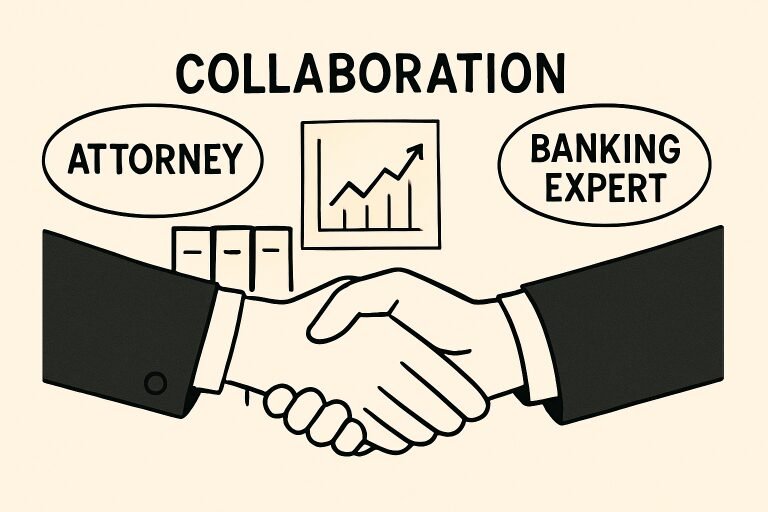Attorneys navigating the complexities of banking litigation often find that their success depends heavily on their ability to explain financial matters to judges and juries clearly. A strategic partnership with expert witnesses can significantly impact a case by providing clarity, credibility, and context. By integrating credible professionals in banking litigation support, attorneys can strengthen their arguments, enhance case preparation, and increase their chances of securing favorable outcomes. Understanding precisely how to incorporate specialists, especially those versed in financial regulations and practices, is essential for effective advocacy. Attorneys who leverage banking litigation support benefit not only from the technical expertise but also from the refined presentation of financial evidence and testimony.
Involving expert witnesses early in litigation helps identify key issues, streamlines discovery, and anticipates opposing strategies, leading to stronger arguments and fewer surprises in court. These specialists make significant contributions to the legal process by providing credible insights, particularly in complex financial disputes. Their expertise is also valuable in alternative dispute resolution (ADR), where it can facilitate negotiations and help resolve conflicts effectively, thus reshaping the handling of intricate banking disputes.
Early Engagement of Experts
Involving a banking litigation expert from the outset of a dispute provides attorneys with strategic advantages. By consulting with an expert before discovery even commences, attorneys clarify which financial issues are central, fine-tune their requests for documents, and avoid pursuing extraneous lines of inquiry. Early guidance from a seasoned professional can also help identify weaknesses in opposing parties’ arguments, leading to targeted and effective strategies.
As explained by Thomson Reuters, the timely engagement of expert witnesses can mean the difference between piecemeal preparation and an integrated, winning approach. Rather than retrofitting a case around an expert’s opinions, early collaboration blends legal and financial strategizing from the outset.
Thorough Vetting Process
Choosing an expert isn’t just a matter of reviewing resumes—it requires rigorous scrutiny. Attorneys must evaluate the credentials, years of experience in the specific field, and the track record of potential experts in previous cases, particularly under cross-examination. Judges and juries quickly detect when an expert’s experience doesn’t match the case at hand, undermining the client’s credibility. Moreover, according to guidance from the American Bar Association, checking professional affiliations, publications, teaching history, and prior testimony are indispensable steps that ensure experts can explain technical details persuasively and withstand scrutiny in court.
Collaborative Case Preparation
Once an expert is chosen, ongoing collaboration with legal counsel is essential. Effective banking litigation experts do more than produce reports—they work in tandem with attorneys to interpret financial data, identify evidence gaps, and prepare impactful exhibits. This back-and-forth results in well-organized cases where every piece of evidence builds a comprehensive narrative. The most persuasive experts translate complicated financial concepts into plain language, making them accessible to jurors and judges who may lack subject matter expertise. This storytelling ability can be decisive, ensuring the judge or jury clearly understands the relevance and impact of the evidence presented.
Leveraging Experts in ADR
Alternative Dispute Resolution—such as mediation or arbitration—often requires expert involvement to overcome impasses and move settlement discussions forward. Experts clarify complex factual issues, help narrow the points of contention, and provide neutral, fact-based opinions that can reduce adversarial posturing. Involving experts during ADR can lead to quicker, less contentious resolutions and help avoid the spiraling costs of prolonged courtroom battles. Their involvement demonstrates a readiness to approach settlements logically and based on facts rather than on speculative arguments.
Cost Management Strategies
While expert witnesses are central to success in banking litigation, their services can be costly if not managed carefully. Attorneys should strive to
- Secure expert involvement earlier to prevent surge pricing and unnecessary last-minute work.
- Clearly define the scope of engagement to ensure expectations align and costly diversions are minimized.
- Leverage internal legal or paralegal staff to assist with data collection, basic research, and document review, reserving the expert’s time for technical tasks.
Proactive management of both scope and budget ensures optimal value and avoids the risk of fee surprises down the line, a key concern in complex financial litigation cases.
Staying Informed on Regulatory Changes
Banking laws and regulations are in a state of constant flux, as illustrated by recent shifts in compliance standards and enforcement priorities. Attorneys should confirm that their experts maintain up-to-date knowledge, regularly attending industry conferences, reviewing new guidance, and adjusting methodologies to align with prevailing judicial and regulatory thinking. Experts who are current with regulatory trends bring higher credibility and relevance, ensuring that testimony is not only accurate for today’s case but also defensible against evolving standards.
Conclusion
Banking litigation is a demanding niche that requires attorneys to integrate legal and financial expertise seamlessly. By involving banking litigation experts at the start, conducting diligent vetting, fostering collaboration, controlling costs, and prioritizing regulatory acumen, attorneys place themselves and their clients in a strong position. In an environment where detail matters, these steps help secure clarity, compliance, and courtroom success.

